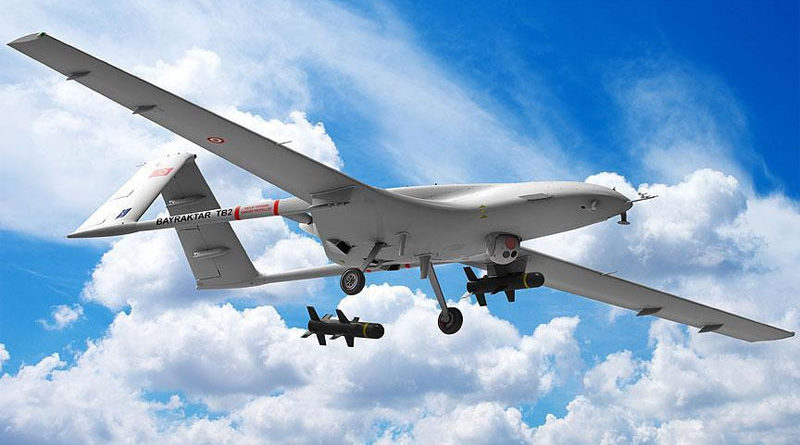This Pakistani Weapon May Pose Threats To Indian Army
November 16, 2020
The world watched in awe as the armed drones from Azerbaijan mercilessly decimated the Armenian air defense systems, artillery guns and tanks and handed them a decisive victory over regional foe Armenia.
The game-changer, as per various experts were the Turkish attack drones that offered a crucial advantage to Azerbaijan over its adversary in the six-week war over Nagorno-Karabakh. Analysts fear that Turkey and even China could offer the same advantage to Pakistan if a war was to erupt with India over the flaring Kashmir dispute.
The dramatic videos released by Azerbaijan as the battle was underway showed Turkish Bayraktar drones pounding targets on surfaces and in trenches, with the Armenian soldiers ending up as sitting ducks.
Armenia reportedly lost about 185 T-72 tanks, 90 armored fighting vehicles, 182 artillery pieces, 73 multiple rocket launchers, 26 surface-to-air missile systems, which include a Tor system and five S-300s, 14 radars or jammers, one SU-25 warplane, four drones and 451 military vehicles, as documented by analyst Stijn Mitzer in the military affairs blog Oryx.
Around 2300 Armenian soldiers were also killed in the bitter clashes.
On the other hand, the losses from Azerbaijan had been far lesser, and as some conclude, just one-sixth of the damage experienced by Armenia.
The war showed how a fleet of relatively low-cost drones can offer decisive air superiority without involving the air force and risking extensive damage. The drone warfare became common ever since the Americans deployed their Predator drones in Afghanistan following the September 11, 2001, attacks.
Today, whichever country holds the technological lead in producing these autonomous systems commands the edge over its rivals.
Turkey’s Bayraktar TB-2 drones helped Azerbaijan dominate the battlefield till the end, which is among the deadliest supplied to the country by Turkey. Just one-eighth the weight of a US MQ-9 Reaper and cruising at just 80 mph, the TB-2 carries four MAM (Turkish for Smart Micro Munition) laser-guided missiles and it is a Medium Altitude Long Endurance (MALE), Tactical Unmanned Aerial Vehicle capable of conducting Intelligence, Surveillance and Reconnaissance (ISR) and armed attack missions.
It was a Bayraktar TB2 drone that had destroyed dozens of Russian-built anti-aircraft vehicles in Syria this year. The Russian Defense Minister Krasnaya Zvezda had reportedly admitted that the country’s defense systems were proving inadequate at such a low altitude where the TB-2 operates.
In the “Operation Spring Shield” in Syria’s Idlib province last February, Bayraktar UAVs proved their mettle with their high hit rates and maneuverability against the Russian Pantsir anti-air defense mechanisms. Turkey released a video showing the missile hit on Pantsir, which the Turkish media claimed was active at the time, indicating the system had failed to detect the Bayraktar drone.
Being a NATO member, Turkey had been importing high-end drones from the US, Germany and even Israel, with some parts from Canada. But after pursuing its own expansionist agenda across the Middle East and other regions, these countries had stopped supplying Turkey with advanced UAVs.
It was in 2014 that Bayraktar Tactic Block 2 (TB2) made its first successful flight, remaining airborne for 24 hours 34 minutes while reaching an altitude of 27 thousand feet (8,230 meters). This was a turning point for Turkey, which had now become an independent UAV manufacturer.
After successive upgrades and tests, 104 armed Bayraktars were delivered to the Turkish armed forces, and its success in the battlefields paved the way for the drone to be exported to other countries.
The battle-proven Bayraktar has already been sold to Qatar and Ukraine, and many other countries have expressed interest in buying the drone from Turkey as its consecutive lethal performances.
Implications For India
Turkey’s close relationship with Pakistan is raising concerns in India about the country’s possible sale of Bayraktar TB-2 armed drones to its military ally. The two countries have been tremendously growing their military relationship since the last few years.
Pakistan’s growing conflicts with its neighbors, particularly India, may compel it to turn to its friend Turkey for acquiring the high-end drones. The TB-2, as it has been proven, is known to completely blind any air defenses,having even defeated the coveted Russian Pantsir and S-300 air defense systems.
The TB-2 is, therefore, indispensable and capable of surprising even the militarily superior countries. Pakistan could use such systems to inflict significant damage to the Indian artillery guns deployed at the border, even the tanks and air defense systems.
Courtesy: Eurasian Times

